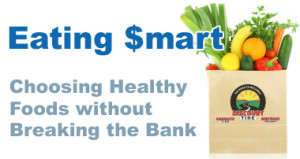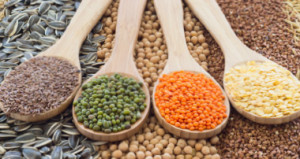
You know you should improve your diet; getting the right nutrients can help you manage your weight, improve your health, and avoid serious health conditions such as high blood pressure, diabetes and heart disease. In our busy lifestyles, we have a tendency to choose processed, unhealthy foods for convenience and low cost. With the simple tips below, you can eat healthy AND be budget conscious.
Start by knowing which foods are the best—and worst—for you.
Choose whole, natural and unprocessed foods for the most nutritional value. Read food labels for nutrient content; look for foods high in fiber and protein with lots of vitamins and minerals. Make the following foods part of your routine:
- Fruits and vegetables: Fruits and veggies are loaded with vitamins, minerals and fiber.
- Whole grains: Breads, pasta and cereals made with whole grains are high in complex carbohydrates and fiber. Oatmeal, quinoa, brown rice and bulgur help fill you up, control weight and reduce the risk of digestive disorders, high cholesterol and diabetes.
 Nuts and seeds: Unprocessed nuts and seeds provide nutrients, healthy fats, filling fiber, protein, and immune-boosting minerals.
Nuts and seeds: Unprocessed nuts and seeds provide nutrients, healthy fats, filling fiber, protein, and immune-boosting minerals.- Beans and legumes: Low in fat and high in fiber, protein, vitamins and minerals, beans and legumes provide a low-cost protein alternative to meat and dairy.
- Limit junk foods. They are the lowest in nutrition, the highest in calories and unhealthy fats, and can add up to be most expensive things in your cart.
Cost saving tips:
- Seasonal fruits and vegetables taste best and are often priced much lower than imported out-of-season varieties.
- Visit local farmers markets where produce is often cheap and fresh.
- Plan your menu ahead of time to help reduce any waste of produce and other fresh foods. Research shows that shoppers without a list tend to buy more food, especially of the snacking variety!
- Buy and cook in bulk. When you buy in larger quantities, you can save money. Make dishes on the weekends that you can eat during the week, or freeze and use at a later date. This saves on expensive last-minute detours to the drive-through window.